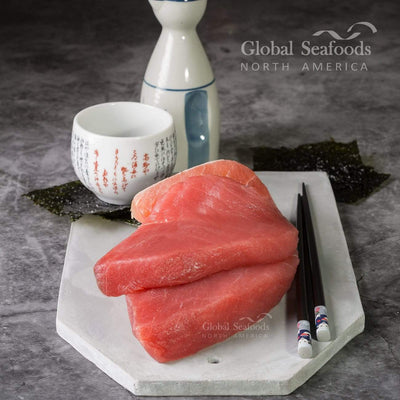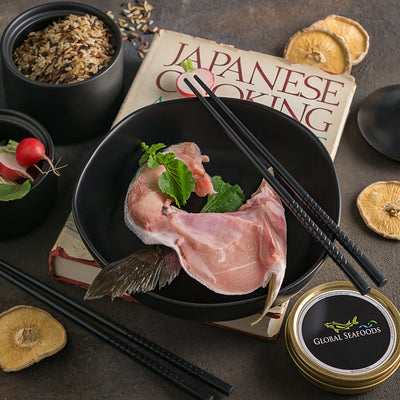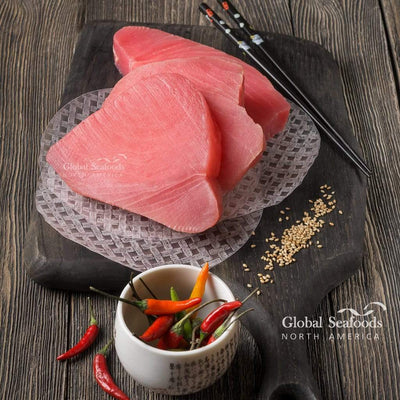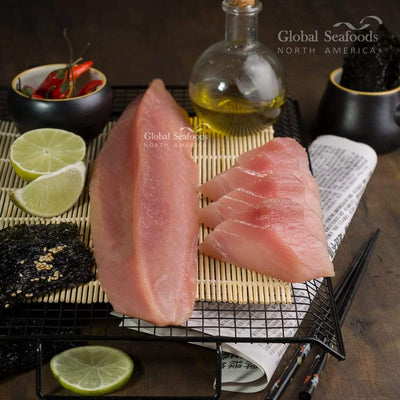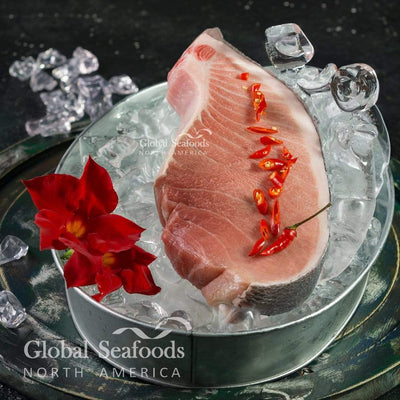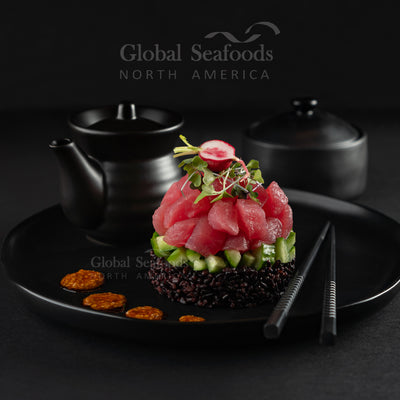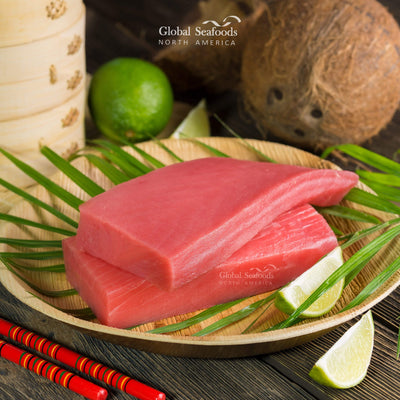Yellowfin Tuna: Health Benefits, Nutrition, Recipes & Best Ways to Cook Ahi Tuna

Yellowfin Tuna: The Ultimate Guide to Nutrition, Health Benefits, and Recipes
Yellowfin tuna, also known as Ahi tuna, is one of the most popular and widely consumed tuna varieties worldwide. Known for its mild flavor, firm texture, and rich nutritional profile, Yellowfin tuna is a favorite among seafood lovers, sushi enthusiasts, and health-conscious individuals.
In this guide, we’ll explore everything you need to know about Yellowfin tuna, including its health benefits, nutritional value, sustainability, and the best ways to prepare it.
What is Yellowfin Tuna?
Yellowfin tuna (Thunnus albacares) is a large, fast-swimming fish found in tropical and subtropical waters worldwide, including the Pacific, Atlantic, and Indian Oceans. It is prized for its lean, firm, and slightly sweet meat, making it a versatile ingredient in many cuisines.
🔹 Common Uses:
✔️ Sushi & Sashimi
✔️ Grilled & Seared Steaks
✔️ Poke Bowls
✔️ Tuna Tartare
✔️ Ceviche
🔹 Where to Buy:
👉 Ahi Tuna Steaks
👉 Sushi-Grade Tuna Saku Blocks
Health Benefits of Yellowfin Tuna
Yellowfin tuna is a nutritional powerhouse, packed with high-quality protein, omega-3 fatty acids, and essential vitamins. Here’s why you should add it to your diet:
1. Rich in Lean Protein
Yellowfin tuna is an excellent source of lean protein, with over 24 grams per 3-ounce serving. Protein is essential for:
✔️ Muscle growth and repair
✔️ Boosting metabolism
✔️ Supporting weight loss
2. High in Omega-3 Fatty Acids
Omega-3s help:
✔️ Reduce inflammation
✔️ Lower blood pressure
✔️ Improve heart health
✔️ Support brain function
🔹 Pro Tip: Eating two servings of Yellowfin tuna per week can significantly improve heart and brain health.
3. Supports Heart Health
Yellowfin tuna is naturally low in saturated fats and high in healthy fats, which help:
✔️ Reduce LDL (bad cholesterol)
✔️ Increase HDL (good cholesterol)
✔️ Improve circulation
4. Enhances Brain Function
Omega-3s, particularly DHA, found in Yellowfin tuna play a crucial role in:
✔️ Cognitive function
✔️ Memory retention
✔️ Reducing the risk of Alzheimer’s disease
5. Packed with Essential Vitamins and Minerals
Yellowfin tuna is rich in vitamins B6, B12, D, and minerals like selenium and potassium. These nutrients help:
✔️ Support red blood cell production
✔️ Boost the immune system
✔️ Strengthen bones and teeth
🔹 Where to Buy:
👉 Albacore Tuna Fresh Whole
Nutritional Profile of Yellowfin Tuna (Per 3-Ounce Serving)
| Nutrient | Amount | % Daily Value |
|---|---|---|
| Calories | 110 | 5% |
| Protein | 24g | 48% |
| Fat | 1g | 2% |
| Omega-3 Fatty Acids | 500mg | – |
| Vitamin B12 | 160% | – |
| Selenium | 50% | – |
| Potassium | 10% | – |
🔹 Low in Calories, High in Nutrients!
Yellowfin Tuna vs. Other Tuna Types
| Feature | Yellowfin Tuna | Bluefin Tuna | Albacore Tuna |
|---|---|---|---|
| Flavor | Mild, slightly sweet | Rich, buttery | Light, mild |
| Texture | Firm, lean | High-fat, tender | Flaky |
| Best Use | Sushi, grilling, steaks | Sushi, sashimi | Canned, salads |
| Mercury Level | Moderate | High | Moderate |
🔹 Best for Grilling & Sushi: Ahi Tuna Steaks
Sustainability and Mercury Levels
While Yellowfin tuna is a great seafood choice, it’s important to choose sustainably sourced options due to overfishing concerns.
✅ Look for these labels when buying Yellowfin tuna:
✔️ Marine Stewardship Council (MSC) Certified
✔️ Pole-and-Line Caught
✔️ Dolphin-Safe Labels
⚠️ Mercury Levels:
Yellowfin tuna contains moderate mercury levels, so it’s recommended to eat no more than 2-3 servings per week.
🔹 Shop Sustainable Tuna:
👉 Tuna Collection
Best Ways to Cook Yellowfin Tuna
Yellowfin tuna is best enjoyed raw, seared, or grilled due to its firm texture and mild flavor.
1. Seared Yellowfin Tuna Steak
🔥 Best for: Quick and easy dinner
Ingredients:
✔️ 2 Yellowfin tuna steaks
✔️ 2 tbsp soy sauce
✔️ 1 tbsp sesame oil
✔️ 1 tsp black pepper
✔️ 1 tbsp lime juice
Instructions:
1️⃣ Marinate tuna in soy sauce, sesame oil, and lime juice for 10 minutes.
2️⃣ Heat a skillet over high heat and sear the tuna for 1-2 minutes per side.
3️⃣ Serve with wasabi and soy sauce.
🔹 Shop Now: Ahi Tuna Steaks
2. Yellowfin Tuna Poke Bowl
🥗 Best for: Fresh, healthy meal
Ingredients:
✔️ 1 lb sushi-grade Yellowfin tuna, cubed
✔️ 2 tbsp soy sauce
✔️ 1 tsp sesame oil
✔️ 1/2 avocado, sliced
✔️ 1/4 cup cucumber slices
✔️ 1 cup cooked rice
Instructions:
1️⃣ Toss tuna cubes in soy sauce and sesame oil.
2️⃣ Arrange rice, tuna, avocado, and cucumber in a bowl.
3️⃣ Garnish with sesame seeds and green onions.
🔹 Shop Now: Sushi-Grade Tuna Saku Blocks
FAQs About Yellowfin Tuna
Is Yellowfin Tuna Good for Weight Loss?
Yes! It’s low in calories, high in protein, and rich in omega-3s, making it an excellent choice for weight management.
Can You Eat Yellowfin Tuna Raw?
Yes! If it’s sushi-grade, it’s safe to eat raw in dishes like sushi, sashimi, and poke bowls.
What is the Best Way to Store Yellowfin Tuna?
- Refrigerate: Store fresh tuna in the coldest part of the fridge and consume within 1-2 days.
- Freeze: Wrap tightly and freeze for up to 3 months.
Final Thoughts on Yellowfin Tuna
Yellowfin tuna is one of the healthiest and most versatile seafood options. Whether you enjoy it raw, grilled, or seared, it’s a delicious and nutritious addition to any diet.
Looking for high-quality Yellowfin tuna?
🔹 Ahi Tuna Steaks
🔹 Sushi-Grade Tuna Saku Blocks
🔹 Tuna Collection
Enjoy premium, sustainable Yellowfin tuna with Global Seafoods! 🌊🐟
Also in News

How to Make Sea Bream Sushi With Dry-Aged Tuna & Crab Roll — Step-by-Step With Chef Joshua
A complete guide to making Sea Bream sushi at home, including filleting, curing, slicing, and building a Dry-Aged Tuna & Crab sushi roll. Chef Joshua shares professional tips for restaurant-quality results.

Cooked Crab for Game Night: Everything You Need for a Perfect Seafood Party
Take your game night to the next level with a Cooked crab party. Learn the best recipes, cooking tips, and hosting hacks for a memorable seafood feast.

Steam Crab for Date Night: A Romantic Guide to the Perfect Seafood Feast
Make your next date night unforgettable with a romantic Steam crab experience. This guide covers everything you need to know, from ambiance to the best crab varieties.

